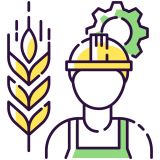In this article:
What is an Agricultural Engineering Degree?
An agricultural engineering degree focuses on applying engineering principles to agriculture and food production. It combines knowledge of science, technology, and engineering to solve problems related to farming, irrigation, soil conservation, and machinery. Students learn how to design systems and tools that improve efficiency, sustainability, and productivity in agriculture.
In this program, students study a mix of subjects, including biology, chemistry, and engineering fundamentals. They learn about irrigation systems, renewable energy in farming, precision agriculture, and the design of farming equipment. Hands-on experience is often a key part of the program, with projects and internships that allow students to work directly with agricultural technologies and real-world problems.
Program Options
When pursuing an agricultural engineering degree, students have several program options to choose from, depending on their career goals and educational aspirations:
- Associate Degree: This two-year program provides a basic introduction to agricultural engineering principles and prepares students for entry-level positions or further study. It covers fundamental subjects like basic engineering concepts, introductory agriculture, and applied sciences.
- Bachelor’s Degree: Typically a four-year program, a Bachelor of Science in Agricultural Engineering offers a comprehensive education in both engineering and agricultural sciences. Students take courses in fluid mechanics, soil science, crop production, and environmental engineering, and they gain hands-on experience through labs, fieldwork, and design projects.
- Master’s Degree: A Master of Science in Agricultural Engineering usually takes two years beyond the bachelor’s degree and allows students to specialize in areas such as precision agriculture, renewable energy, or environmental sustainability. This program often involves advanced coursework and a research thesis or capstone project.
- Doctoral Degree (Ph.D.): This research-intensive program typically takes 4-6 years to complete and is aimed at those who wish to pursue careers in academia, advanced research, or high-level industry positions. Students conduct original research, contribute to academic publications, and develop new technologies or methods in agricultural engineering.
Skills You’ll Learn
An agricultural engineering degree equips students with a variety of skills that are essential for improving and managing agricultural systems. Here are some key skills learned through the program:
- Technical Proficiency: Students gain a solid understanding of engineering principles, including fluid mechanics, thermodynamics, and structural analysis, as they apply to agricultural systems. This technical knowledge is crucial for designing and managing irrigation systems, machinery, and structures used in farming.
- Problem-Solving Abilities: The program emphasizes critical thinking and problem-solving skills. Students learn to identify challenges in agricultural practices and develop innovative solutions, such as improving irrigation efficiency or designing automated farming equipment.
- Environmental and Sustainability Knowledge: Students learn about sustainable agricultural practices and environmental management. They study soil conservation, water resource management, and renewable energy systems, which are essential for promoting environmentally friendly and sustainable farming.
- Precision Agriculture Skills: Precision agriculture involves using technology to monitor and manage crops and livestock. Students learn to use GPS, sensors, drones, and data analysis tools to optimize farming practices, increase yields, and reduce waste.
- Project Management: Managing agricultural projects requires planning, organizing, and overseeing various tasks. Students develop project management skills, including budgeting, scheduling, and teamwork, which are essential for implementing large-scale agricultural projects.
- Communication and Collaboration: Effective communication is crucial in agricultural engineering. Students learn to communicate technical information clearly and work collaboratively with farmers, agronomists, and other stakeholders. They also develop skills in writing technical reports and presenting their findings.
- Hands-On Experience: Through lab work, field studies, and internships, students gain practical experience. This hands-on training allows them to apply their theoretical knowledge to real-world agricultural challenges and develop practical skills in using and maintaining agricultural machinery and equipment.
What Can You Do with an Agricultural Engineering Degree?
An agricultural engineering degree opens up a variety of career opportunities across different sectors. Here are some potential career paths and roles for graduates:
- Agricultural Engineer: Agricultural engineers design and manage systems for irrigation, drainage, soil conservation, and machinery used in farming. They work to improve the efficiency and sustainability of agricultural operations, developing new technologies and methods to enhance productivity.
- Environmental Consultant: Graduates can work as environmental consultants, helping to ensure that agricultural practices comply with environmental regulations. They focus on sustainable land and water use, pollution control, and resource management to minimize the environmental impact of farming.
- Farm Manager: With their technical and managerial skills, agricultural engineers can manage large farming operations. Farm managers oversee daily activities, implement efficient farming techniques, and ensure that operations run smoothly and profitably.
- Soil and Water Conservationist: This role involves developing and implementing conservation plans to protect soil and water resources. Conservationists work with farmers to adopt practices that prevent erosion, improve soil health, and manage water resources effectively.
- Precision Agriculture Specialist: Specialists in precision agriculture use advanced technology, such as GPS, sensors, and drones, to monitor and manage crops and livestock. They help farmers optimize their practices, increase yields, and reduce waste by providing data-driven insights and recommendations.
- Irrigation Engineer: These engineers focus on designing and managing irrigation systems to ensure efficient water use in agriculture. They work on developing innovative solutions to water scarcity and improving irrigation techniques to enhance crop yields.
- Agricultural Equipment Designer: These engineers design and develop new machinery and equipment used in farming. They work on creating more efficient, safe, and user-friendly tools that help farmers increase productivity and reduce labor costs.

